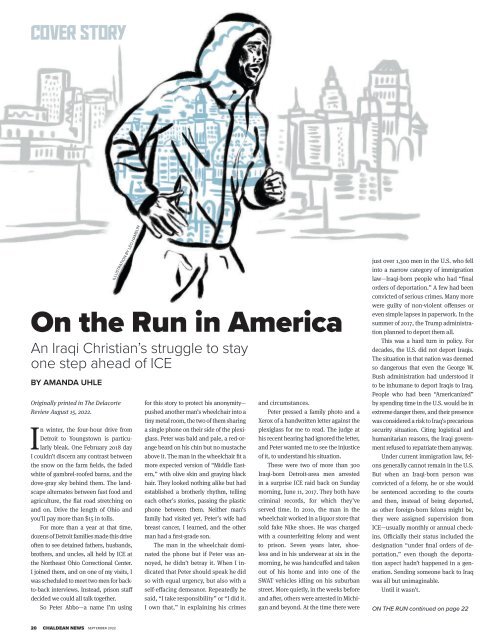Create successful ePaper yourself
Turn your PDF publications into a flip-book with our unique Google optimized e-Paper software.
COVER STORY<br />
On the Run in America<br />
An Iraqi Christian’s struggle to stay<br />
one step ahead of ICE<br />
BY AMANDA UHLE<br />
Originally printed in The Delacorte<br />
Review August 15, <strong>2022</strong>.<br />
ILLUSTRATION BY LÉO HAMELIN<br />
In winter, the four-hour drive from<br />
Detroit to Youngstown is particularly<br />
bleak. One February 2018 day<br />
I couldn’t discern any contrast between<br />
the snow on the farm fields, the faded<br />
white of gambrel-roofed barns, and the<br />
dove-gray sky behind them. The landscape<br />
alternates between fast food and<br />
agriculture, the flat road stretching on<br />
and on. Drive the length of Ohio and<br />
you’ll pay more than $15 in tolls.<br />
For more than a year at that time,<br />
dozens of Detroit families made this drive<br />
often to see detained fathers, husbands,<br />
brothers, and uncles, all held by ICE at<br />
the Northeast Ohio Correctional Center.<br />
I joined them, and on one of my visits, I<br />
was scheduled to meet two men for backto-back<br />
interviews. Instead, prison staff<br />
decided we could all talk together.<br />
So Peter Abbo—a name I’m using<br />
for this story to protect his anonymity—<br />
pushed another man’s wheelchair into a<br />
tiny metal room, the two of them sharing<br />
a single phone on their side of the plexiglass.<br />
Peter was bald and pale, a red-orange<br />
beard on his chin but no mustache<br />
above it. The man in the wheelchair fit a<br />
more expected version of “Middle Eastern,”<br />
with olive skin and graying black<br />
hair. They looked nothing alike but had<br />
established a brotherly rhythm, telling<br />
each other’s stories, passing the plastic<br />
phone between them. Neither man’s<br />
family had visited yet. Peter’s wife had<br />
breast cancer, I learned, and the other<br />
man had a first-grade son.<br />
The man in the wheelchair dominated<br />
the phone but if Peter was annoyed,<br />
he didn’t betray it. When I indicated<br />
that Peter should speak he did<br />
so with equal urgency, but also with a<br />
self-effacing demeanor. Repeatedly he<br />
said, “I take responsibility” or “I did it.<br />
I own that,” in explaining his crimes<br />
and circumstances.<br />
Peter pressed a family photo and a<br />
Xerox of a handwritten letter against the<br />
plexiglass for me to read. The judge at<br />
his recent hearing had ignored the letter,<br />
and Peter wanted me to see the injustice<br />
of it, to understand his situation.<br />
These were two of more than 300<br />
Iraqi-born Detroit-area men arrested<br />
in a surprise ICE raid back on Sunday<br />
morning, June 11, 2017. They both have<br />
criminal records, for which they’ve<br />
served time. In 2010, the man in the<br />
wheelchair worked in a liquor store that<br />
sold fake Nike shoes. He was charged<br />
with a counterfeiting felony and went<br />
to prison. Seven years later, shoeless<br />
and in his underwear at six in the<br />
morning, he was handcuffed and taken<br />
out of his home and into one of the<br />
SWAT vehicles idling on his suburban<br />
street. More quietly, in the weeks before<br />
and after, others were arrested in Michigan<br />
and beyond. At the time there were<br />
just over 1,300 men in the U.S. who fell<br />
into a narrow category of immigration<br />
law—Iraqi-born people who had “final<br />
orders of deportation.” A few had been<br />
convicted of serious crimes. Many more<br />
were guilty of non-violent offenses or<br />
even simple lapses in paperwork. In the<br />
summer of 2017, the Trump administration<br />
planned to deport them all.<br />
This was a hard turn in policy. For<br />
decades, the U.S. did not deport Iraqis.<br />
The situation in that nation was deemed<br />
so dangerous that even the George W.<br />
Bush administration had understood it<br />
to be inhumane to deport Iraqis to Iraq.<br />
People who had been “Americanized”<br />
by spending time in the U.S. would be in<br />
extreme danger there, and their presence<br />
was considered a risk to Iraq’s precarious<br />
security situation. Citing logistical and<br />
humanitarian reasons, the Iraqi government<br />
refused to repatriate them anyway.<br />
Under current immigration law, felons<br />
generally cannot remain in the U.S.<br />
But when an Iraqi-born person was<br />
convicted of a felony, he or she would<br />
be sentenced according to the courts<br />
and then, instead of being deported,<br />
as other foreign-born felons might be,<br />
they were assigned supervision from<br />
ICE—usually monthly or annual checkins.<br />
Officially their status included the<br />
designation “under final orders of deportation,”<br />
even though the deportation<br />
aspect hadn’t happened in a generation.<br />
Sending someone back to Iraq<br />
was all but unimaginable.<br />
Until it wasn’t.<br />
ON THE RUN continued on page 22<br />
20 CHALDEAN NEWS <strong>SEPTEMBER</strong> <strong>2022</strong>

















